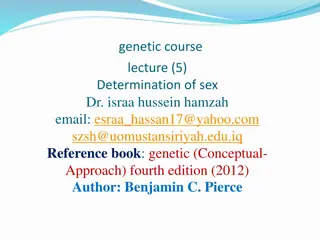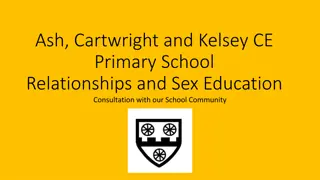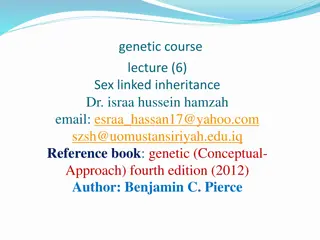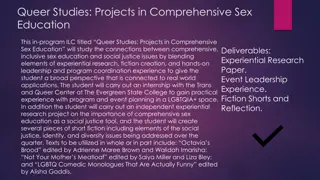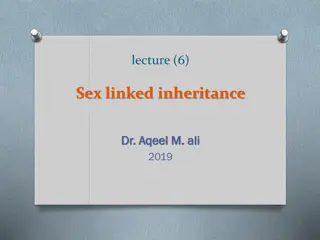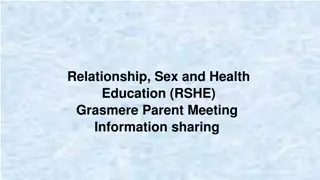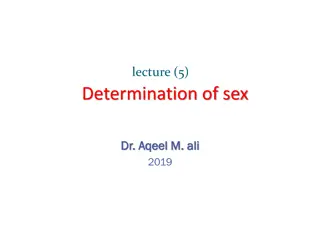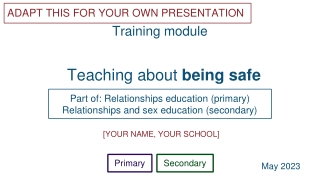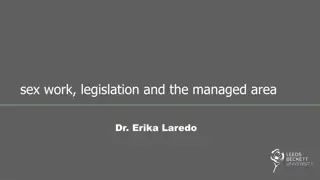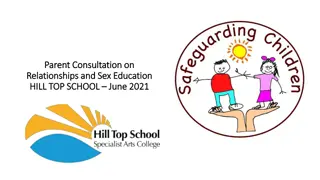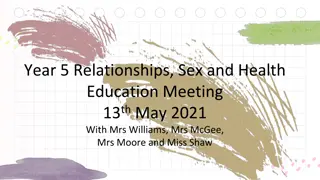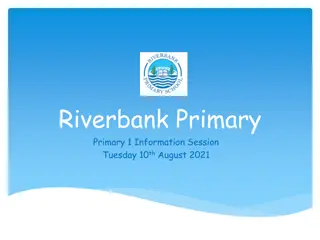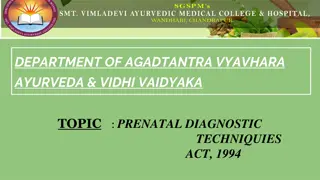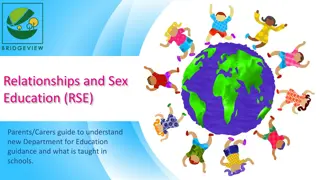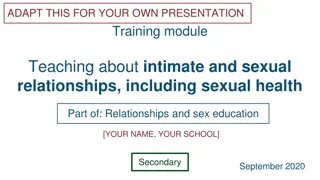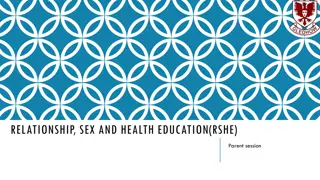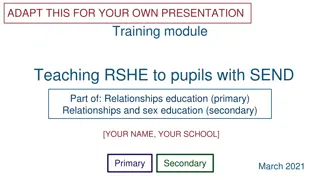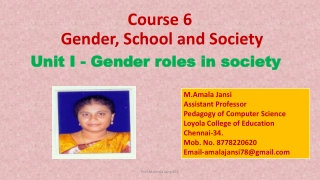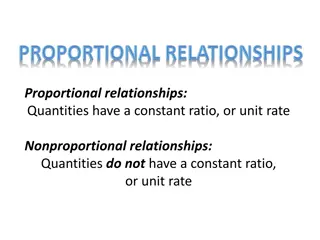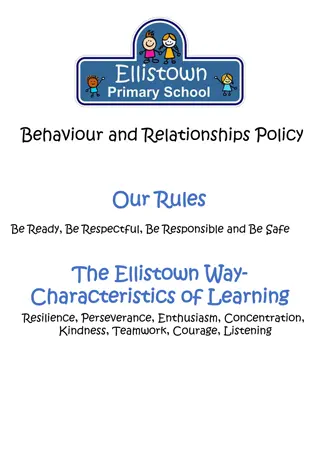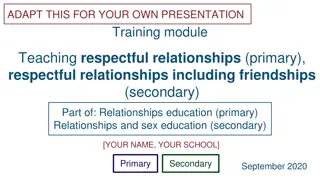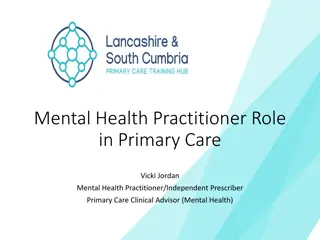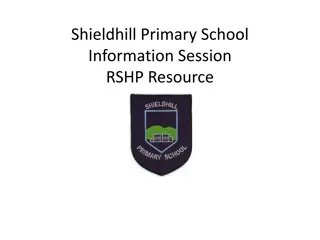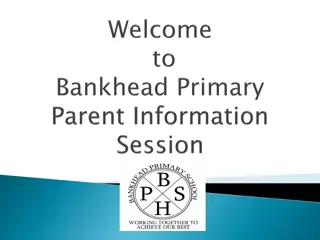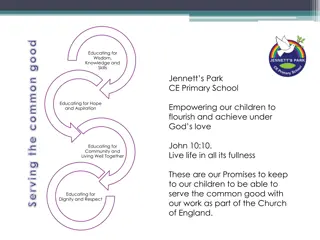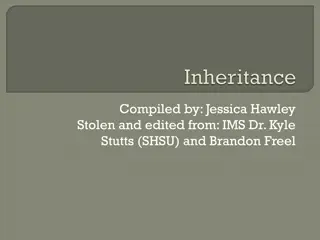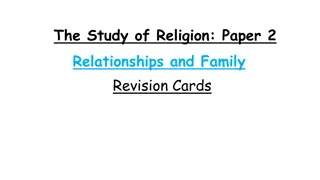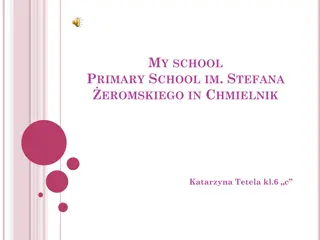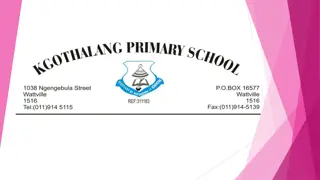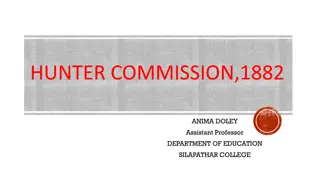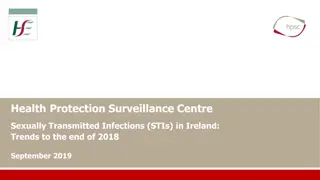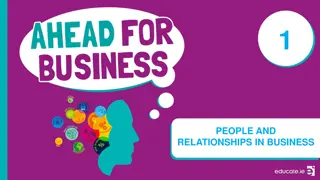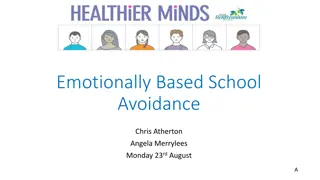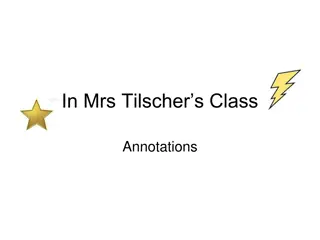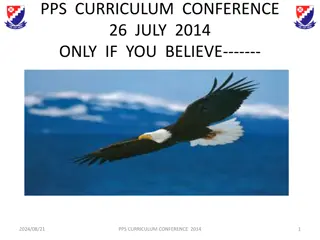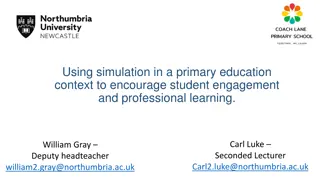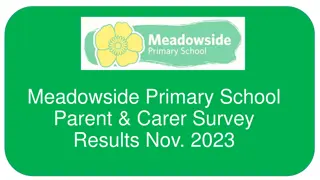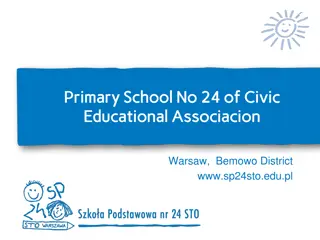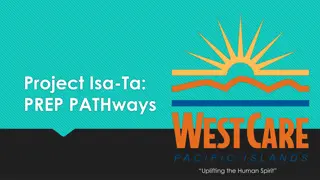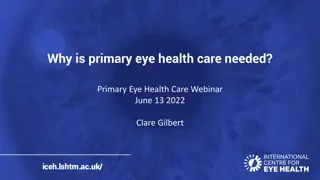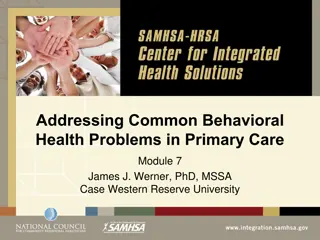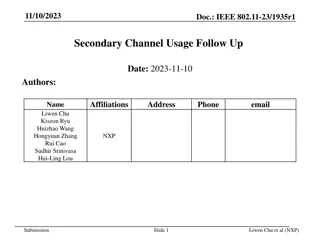Understanding Relationships and Sex Education at Cheetwood Primary School
Explore the key aspects of Relationships and Sex Education (RSE) at Cheetwood Primary School as detailed by Miss Fisher, Head of Pastoral Care. Discover the importance of PSHE, concerns about the new RSE curriculum, RSE guidelines, parental rights to withdraw children, and the development of an updated curriculum. Get insights into what RSE covers, parental involvement, and the upcoming changes effective from September 2020.
Download Presentation

Please find below an Image/Link to download the presentation.
The content on the website is provided AS IS for your information and personal use only. It may not be sold, licensed, or shared on other websites without obtaining consent from the author. Download presentation by click this link. If you encounter any issues during the download, it is possible that the publisher has removed the file from their server.
E N D
Presentation Transcript
Relationships and Sex Education Cheetwood Focus Group BY Miss Fisher Head of Pastoral care
Aims for today What is PSHE? What are your concerns and worries about the new RSE Curriculum? What is RSE ? Can Parents withdraw their child? RSE expectations in primary schools What does our curriculum look like now? Programmes we already deliver Explain the changes to requirements for RSE coming in from September 2020 New programmes being introduced at Cheetwood in 2020 Get your views on what you think our RSE curriculum should cover Explain how we ll develop our updated curriculum
What does P.S.H.E stand for? Personal Social Health Education PSHE is an important part of your child's national curriculum learning
RSE What do you know or have heard about the new RSE curriculum? What are your concerns or worries? Please complete the task sheet 1 provided. If we don t address your concerns in this power point, we will in our next one.
What is RSE Relationships and sex education (RSE) is part of the PSHE curriculum which runs from Year 1 to Year 11 RSE was Previously known as - Sex and Relationships Education (SRE) and here at Cheetwood we have been delivering SRE to the pupils for the past 6 years. The new RSE guidelines says we must provide the following to all pupils: Relationships Education Health Education As a Primary school we are not required to provide sex education. This does not come into the curriculum until year 7. For this reason at Cheetwood we will be referring to RSE as Relationship Education (R.E)
Can parents withdraw their children from school RSE or at our school R.E? The new legislation brought in through the Children and Social Work Act 2017 will bring about some important changes in relation to parental rights to withdraw children from school RSE: Parents will not be able to withdraw their child from Relationships Education in primary school or secondary school Primary schools are required to teach National Curriculum science, which includes some elements of sex education. (KS2) Parents do not have a right to withdraw from this. Schools will continue to be required to publish policies on these subjects for parents, and statutory guidance will continue to set out that schools should consult parents on those policies to ensure they are feeding in their views. Full details of the new requirements are available in the new Government RSE guidance available from Gov.uk
R.S.E. expectations: primary Schools Here s what the guidelines say pupils should have learnt about, by the end of primary school In regards to Relationships
Families and people who care for me That families are important for children growing up because they can give love, security and stability The characteristics of healthy family life, commitment to each other, including in times of difficulty, protection and care for children and other family members, the importance of spending time together and sharing each other s lives That others families, either in school or in the wider world, sometimes look different to their family, but that they should respect those differences and know that other children s families are also characterized by love and care That stable, caring relationships, which may be of different types, are at the heart of happy families, and are important for children s security as they grow up That marriage represents a formal and legally recognized commitment of two people to each other which is intended to be lifelong How to recognise if family relationships are making them feel unhappy or unsafe, and how to seek help or advice from others if needed
Caring friendships How important friendships are in making us feel happy and secure, and how people choose and make friends The characteristics of friendships, including mutual respect, honesty, trustworthiness, loyalty, kindness, generosity, sharing interests and experiences and support with problems and difficulties That healthy friendships are positive and welcoming towards others, and do not make others feel lonely or excluded That most friendships have ups and downs, and that these can often be worked through so that the friendship is repaired or even strengthened, and that resorting to violence is never right How to recognise who to trust and who not to trust, how to judge when a friendship is making them feel unhappy or uncomfortable, managing conflict, how to managing these situations and how to seek help or advice from others if needed
Respectful relationships The importance of respecting others, even when they re very different from them (for example, physically, in character, personality or backgrounds), or make different choices or have different preferences or beliefs Practical steps they can take in a range of different contexts to improve or support respectful relationships The conventions of courtesy and manners The importance of self-respect and how this links to their own happiness That in school and in the wider world they can expect to be treated with respect by others, and that in turn they should show respect to others, including those in positions of authority About different types of bullying (including cyberbullying), the impact of bullying, responsibilities of bystanders (primarily reporting bullying to an adult) and how to get help What a stereotype is, and how stereotypes can be unfair, negative or destructive The importance of permission-seeking and giving in relationships with friends, peers and adults
Online relationships That people sometimes behave differently online, including by pretending to be someone they re not That the same principles apply to online relationships as face-to-face relationships, including the importance of respect for other online (even when we re anonymous) The rules and principles for keeping safe online, how to recognise risks, harmful content and contact, and how to report them How to critically consider their online friendships and sources of information, including awareness of the risks associated with people they ve never met How information and data is shared and used online
Being safe What sorts of boundaries are appropriate in friendships with peers and others (including in a digital context) About the concept of privacy and the implications of it for both children and adults (including that its not always right to keep secrets if they relate to being safe) That each person s body belongs to them, and the differences between appropriate and inappropriate/unsafe physical and other contact How to respond safely and appropriately to adults they may encounter (in all contexts, including online) who they don t know How to recognise and report feelings of being unsafe or feeling bad about any adult How to ask for advice or help for themselves or others, and to keep trying until they re heard How to report concerns or abuse, and the vocabulary and confidence needed to do so Where to get advice (e.g. family, school, other sources)
What does our curriculum look like now? The PSHE Curriculum has 5 core areas Healthy Lifestyles Relationships (R.E) Living in the wider world Keeping Safe Mental and Emotional Health
What do you think? Look task sheet 2 What year group do you think these objectives are covered in?
Early Years Foundation Stage In early years we teach the following: Friendships Respecting each other Please and Thankyou- using our manners Good to be green What makes a good friend Emotional literacy Pants- Privates are private Different Families, same love
Phase 1- Year Year 3 To communicate their feelings to others, to recognise how others show feelings and how to respond- To recognise how their behaviour affects other people The difference between secrets and surprises and the importance of not keeping adults secrets, only surprises. To recognise what is fair and unfair, kind and unkind, what is right and wrong To share their opinions on things that matter to them and explain their views through discussions with one other person and the whole class To listen to other people and play and work cooperatively (including strategies to resolve simple arguments through negotiation) To offer constructive support and feedback to others
Phase 1 To identify and respect the differences and similarities between people To identify their special people (family, friends, carers), what makes them special and how special people should care for one another To judge what kind of physical contact is acceptable, comfortable, unacceptable and uncomfortable and how to respond (including who to tell and how to tell them) That people s bodies and feelings can be hurt (including what makes them feel comfortable and uncomfortable) To recognise when people are being unkind either to them or others, how to respond, who to tell and what to say? That there are different types of teasing and bullying, that these are wrong and unacceptable
Phase 1 How to resist teasing or bullying, if they experience or witness it, whom to go to and how to get help. The names for the main parts of the body (including external genitalia) The similarities and differences between boys and girls. About the process of growing from young to old and how people s needs change. About growing and changing and new opportunities and responsibilities that increasing independence may bring. About people who look after them, their family networks, who to go to if they are worried and how to attract their attention, ways that pupils can help these people to look after them. Who are the special people in my life (family)
Phase 2 - Year 4- Year 6 To recognize and respond appropriately to a wider range of feelings in others. To recognise what constitutes a positive, healthy relationship and develop the skills to form and maintain positive and healthy relationships. To recognise ways in which a relationship can be unhealthy and who to talk to if they need support. To be aware of different types of relationship, including those between friends and families, civil partnerships and marriage. That their actions affect themselves and others . To judge what kind of physical contact is acceptable or unacceptable and how to respond.
Phase 2 The concept of keeping something confidential or secret , when we should or should not agree to this and when it is right to break a confidence or share a secret To listen and respond respectfully to a wide range of people, to feel confident to raise their own concerns, to recognise and care about other people's feelings and to try to see, respect and if necessary constructively challenge their points of view. To work collaboratively towards shared goals. To develop strategies to resolve disputes and conflict through negotiation and appropriate compromise and to give rich and constructive feedback and support to benefit others as well as themselves. That differences and similarities between people arise from a number of factors, including family, cultural, ethnic, racial and religious diversity, age, sex, gender identity, sexual orientation, and disability.
Phase 2 : To realise the nature and consequences of discrimination, teasing, bullying and aggressive behaviours (including cyber bullying, use of prejudice-based language, how to respond and ask for help) To recognise and manage dares To recognise and challenge stereotypes. How their body will change as they approach and move through puberty - About Human Reproduction. What is Diversity? Do boys and girls have different roles Puberty and Menstruation-what changes happen to my body What changes happen in my life?
What do you think? Are there any differences in what you thought? Do you think certain objectives should be taught in different year groups and why? Please complete task sheet 3 and We will address these differences in our next meeting.
Programmes we already use These are the programmes we use at Cheetwood to meet the objectives. All programmes we deliver at Cheetwood can be viewed on our website
Growing and Changing This is a programme that was put together by healthy schools. It covers age appropriate areas such as puberty, how our body changes, differences between boys and girls, reproduction, hygiene, dental care and keeping ourselves safe. This programme cover all areas required to be taught in Health Education
overview for Year 1 Year 3 Year 1 Lesson 1Personal Identity, - Self-Esteem And Confidence Lesson 2 Friendship And Relationships -Males and females Lesson 3 Growing Up -Baby animals Lesson 4 Body Changes -Babies, children, Lesson 5 Hygiene - Looking after our teeth Oral Health Lesson 6 Personal safety Year 2 Lesson 1Personal Identity, -Self-Esteem And Confidence Lesson 2 Friendship and Relationships - Different and similar Lesson 3 Growing Up -How did I get here? Lesson 4 Body Changes Life cycles Cycle of life activity Lesson 5 Hygiene - Clean hands! Lesson 6 Personal Safety, People I trust Year 3 Lesson 1 Personal Identity, - Self-Esteem And Confidence -What is good about me? Lesson 2 Friendship And Relationships Lesson 3 Growing Up Changing and staying the same Lesson 4 Body Changes Different clothes Lesson 5 Hygiene What can I do to keep myself clean Lesson 6 Personal Safety Who can I talk to?
Overview for Year 4 - Year 6 Year 4 Lesson 1 Personal Identity, -Self-Esteem And Confidence Lesson 2 Friendship And Relationships -What Is A Friend? Lesson 3 Growing Up When Will I Start To Change? Lesson 4 Body Changes How Will I Change? Lesson 5 Hygiene -How Do I Keep Myself Clean? Lesson 6 Personal Safety How Do I Keep Myself Safe Year 5 Lesson 1 Personal Identity, Self-Esteem And Confidence -Different Roles Lesson 2 Friendship And Relationships Different Relationships Lesson 3 Puberty Changes Boys And Girls - Puberty Changes Boys And Girls Male And Female -Inside Body Parts Lesson 4 Body Changes Recognising Puberty Changes Girls Only/Boys Only Discussion Lesson 5 Hygiene - In A Social Situation Lesson 6 Personal Safety - Keeping Yourself Safe Year 6 Lesson 1 Personal Identity, Self-Esteem And Confidence -Respecting Difference It s Ok To Be Different Lesson 2 Friendship And Relationships Different Feelings Lesson 3 Growing Up Girl Talk/Boy Lesson 4 Body Changes My Up And Down Day CD-ROM: Lesson 5 Hygiene Watching What I Say! Lesson 6 Personal Safety Am I Safe When Texting And In Chatrooms?
Free Programme Year 3 Danni is the Chief of her tribe and Shivvum and Charlie are her tow trusty warriors. People in Danni s neighbourhood don t think girls should be allowed to play with boys, let alone be in charge. They keep saying Danni isn t a real girl. This story looks at stereotypes, being yourself and Bullying Year 4 Jake and Harry are best friends but they don't like all the same things. Their friendship is put to the test when Jake admits that he'd rather go to a drama lesson than watch Harry's important football match. This story looks at friendships, stereotypes and celebrating differences Year 5 Emma loves her two mums and dads even if, like all parents, they can be annoying. But when Emma's friend tells her she's not allowed to sleep over because her mum doesn't like Emma's parents, Emma starts to wonder if there's something wrong with her family This story looks at different families, identity and prejudice towards gay people Year 6 Linus is really proud that his older brother Jordan is about to become a pro footballer. But Linus doesn't like the fact Jordan has a boyfriend, Toby. He thinks pro footballers can't be gay and that he'll get bullied for having a gay brother, so plots to break them up. This story looks at family relationships, stereotypes in sports and homophobic language
Different Families same love This programme celebrates different types of families and, although all our families may be different, we all have the same love.
And Tango makes three This book tells the story of two male penguins, Roy and Silo, who create a family together. With the help of the zookeeper, Roy and Silo are given an egg which they help hatch. The female chick, that completes their family, is named "Tango".The book was based on the true story of Roy and Silo, two male chinstrap penguins who fell in love in New York's Central Park Zoo. The story demonstrates different family, same love
Healthy relationships The Healthy Relationships programme provides the opportunity for teachers to raise awareness about Healthy Relationships and Domestic Violence to all Year 5 and Year 6 pupils. This programme encourages discussion and debate around the following topics: Respectful relationships Consequences of being violent Gender inequality Conflict management Experiences of Domestic Violence Where to go for help Forced marriage
Real love Rock Real Love Rocks is a programme designed by Barnardo s and a follow up to Healthy Relationships enabling Year 6 pupils to explore and understand: Child Sexual Exploitation (C.S.E) Grooming both online and face to face Healthy Relationships Staying safe For more information on this programme, topics or advice please go to the Parent Hub on the Barnardo s website: www.barnardosrealloverocks.org.uk
Speak out, Stay safe The NSPCC deliver age appropriate assemblies to Early years, Phase 1 and Phase 2. The Speak out, Stay safe programme introduces the children s rights: The right to speak out and be heard. The right to be safe. The right to get help when they need it. The programme also introduces the definitions of abuse.
Definition of Abuse Phase 1 Hitting Hurting children s feelings Privates are private Not looked after properly Bullying Where and how to get help Phase 2 Physical abuse Emotional abuse Sexual abuse Neglect Bullying Where and how to get help
S.O.P.H.I.E = Stamp Out Prejudice, Hatred and Intolerance Everywhere At Cheetwood combating hate crime is important and by implementing the S.O.P.H.I.E programme pupils are supported to look safely at issues of diversity and to explore how the differences between people, particularly differences in appearances, determine judgements and actions. By participating in this programme the pupils will learn: To avoid judging people solely on their appearance/subculture To seek out similarities between people rather than their differences To find value in differences between people The outcomes of this programme integrate with key areas across the three core themes of Phase 2 P.S.H.E and SEAL S.O.P.H.I.E is an educational programme designed to further the aims of the Sophie Lancaster Foundation. For more information please visit the website www.sophielancasterfoundation.com
Choices and consequences Choices and Consequences is a programme designed by Greater Manchester Police and is delivered by the Head of Pastoral Care alongside a local Police and Community Support Officer and an officer of the Greater Manchester Police. This programme explores the following issues: Peer pressure Recognising how choices can affect own safety as well as the safety of others Understanding the dangers associated with aerosols Gangs and knife crime All actions have consequences
These programmes have been delivered successfully here at Cheetwood for a number of years. So we will continue to deliver them. If you have any comments about these programmes please complete task sheet 4 and we will address them at our next meeting.;
Changes for 2020 Although at Cheetwood we feel we have been delivering the majority of core areas for many years there will be a couple of changes we need to introduce to meet the recommended guidelines these being:
Phase 1 The names for the main parts of the body (including external genitalia). This lesson will be taught as part of the science national curriculum . Along with other body parts Phase 1 children will be taught the scientific words penis and vagina
One of the main reasons why the government have decided to teach this in Phase 1, is safeguarding. Safeguarding our children is a priority. Young children are taught slang names for their body parts. (flower, winky).This is down to adult embarrassment, which then becomes embedded in the child. The child learns that the scientific names for these parts should not be used. However, research has shown that an abuser would think twice about abusing a child, if the child is confident when talking about and naming their body parts. As a safeguarding officer I have come across sexual abuse cases that have been prolonged because the child has used slang names. If the child had used the correct terminology then the abuse could have been identified and stopped sooner.
Your thoughts Which year group do you think this should be delivered in and why? Please write comments on task sheet 4
Changes in Phase 2 Introducing FGM to Year 5 Female genital mutilation (FGM) is any procedure that alters or injures a girl or woman s genital organs for non- medical reasons. The procedure is illegal in the UK, and it is also illegal to take a British national or permanent resident abroad to perform the procedure. FGM is usually carried out between infancy and 15 years of age, and may affect pupils in our school. At Cheetwood we have taught awareness about FGM to Year 6 Pupils for the past 5 years, However next year this will be addressed in the Y5 puberty lessons.(girls only)
New Programmes for 2020 We are what we eat Staying safe online The way we feel All information for these programmes will be put on the school website.
Questions Please complete the remaining questions on task sheet 5 What are your thoughts on our current curriculum for RSE ? Do you think this curriculum meets your child s needs? What do we do well? /What could we do better? Is there anything we re not covering that you think we need to address? Is there something we could cover more/less? What do you think about the way we currently deliver RSE to pupils? As a parent, do you feel like you need more information or guidance on specific topics?
What Happens Next We re also getting feedback from: Staff Pupils Governors Once we ve considered all the feedback, we ll address any worries and concerns in our next meeting/workshop We will then draft an updated R.E policy, which will set out our proposed curriculum. There will be a formal consultation period before the updated policy is approved.
Thank you for your participation and time. Together we will provide the appropriate R.E curriculum for the children at Cheetwood.


